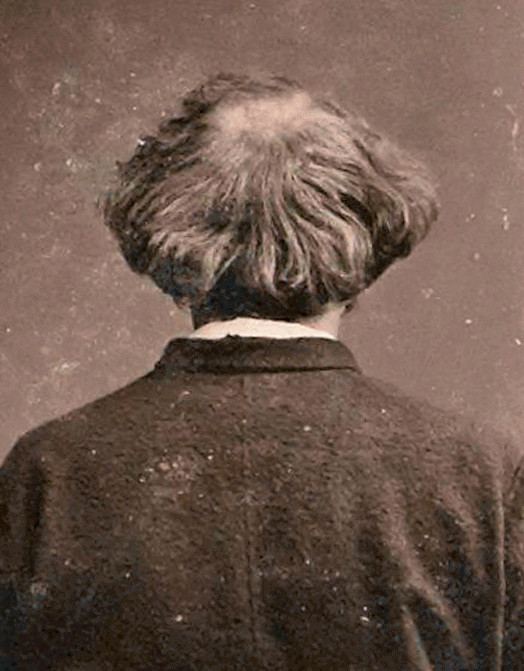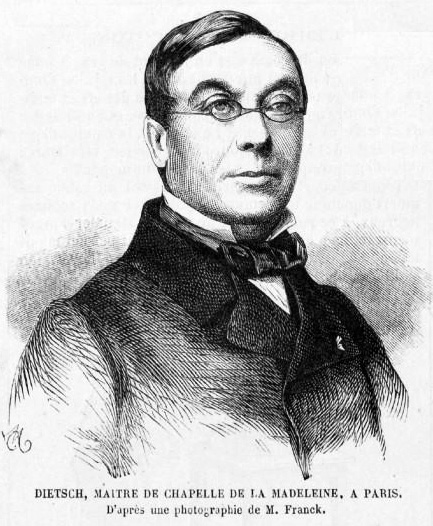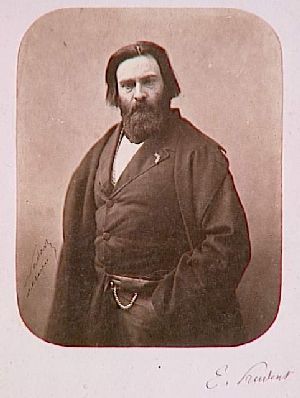|
Antoine Elwart
Antoine Aimable Elie Elwart (19 September 1808 – 14 October 1877) was a French composer and musicologist. Biography Childhood Elwart was born in Paris in the family home. At the age of ten, he became a chorister at the mastery of the Saint-Eustache church: Antoine Ponchard (a master of the chapel since 1815) ensured his first musical training. This teaching marked him for all his life, and spiritual music remained one of his great influences. Curious to discover the activity of professional musicians, he escaped from the work of manufacturer of crates where his parents had sent him and managed to become second violin in a street orchestra. In 1823, at the age of fifteen, a mass with four voices and a large orchestra of his composition was given at St-Roch Church. Training In 1825, the singer Cambon interpreted a scene by Elwart on the motif of the "Exiled". This year marked especially his entrance to the École royale de musique (the future Conservatoire de Paris) in counter ... [...More Info...] [...Related Items...] OR: [Wikipedia] [Google] [Baidu] |
Nadar (photographer)
Gaspard-Félix Tournachon (5 April 1820 – 20 March 1910), known by the pseudonym Nadar, was a French photographer, caricaturist, journalist, novelist, balloonist, and proponent of heavier-than-air flight. In 1858, he became the first person to take aerial photographs. Photographic portraits by Nadar are held by many of the great national collections of photographs. His son, Paul Nadar (1856–1939), continued the studio after his death. Life Gaspard-Félix Tournachon (also known as Nadar) was born in early April 1820 in Paris, though some sources state he was born in Lyon. His father, Victor Tournachon, was a printer and bookseller. Nadar began to study medicine but quit for economic reasons after his father's death. Nadar started working as a caricaturist and novelist for various newspapers. He fell in with the Parisian bohemian group of Gérard de Nerval, Charles Baudelaire, and Théodore de Banville. His friends picked a nickname for him, perhaps by a playful habit of ad ... [...More Info...] [...Related Items...] OR: [Wikipedia] [Google] [Baidu] |
Antoine Reicha
Anton (Antonín, Antoine) Joseph Reicha (Rejcha) (26 February 1770 – 28 May 1836) was a Czech-born, Bavarian-educated, later naturalized French composer and music theorist. A contemporary and lifelong friend of Beethoven, he is now best remembered for his substantial early contributions to the wind quintet literature and his role as teacher of pupils including Franz Liszt, Hector Berlioz and César Franck. He was also an accomplished theorist, and wrote several treatises on various aspects of composition. Some of his theoretical work dealt with experimental methods of composition, which he applied in a variety of works such as fugues and études for piano and string quartet. None of the advanced ideas he advocated in the most radical of his music and writings, such as polyrhythm, polytonality and microtonal music, were accepted or employed by other nineteenth-century composers. Due to Reicha's unwillingness to have his music published (like Michael Haydn before him), he fell ... [...More Info...] [...Related Items...] OR: [Wikipedia] [Google] [Baidu] |
18th Arrondissement Of Paris
The 18th arrondissement of Paris (''XVIIIe arrondissement'') is one of the 20 arrondissements of the capital city of France. In spoken French, this arrondissement is referred to as ''dix-huitième''. The arrondissement, known as Butte-Montmartre, is located on the right bank of the River Seine. It is mostly known for hosting the district of Montmartre which contains a hill known for its artistic history, the Bateau-Lavoir where Pablo Picasso, Georges Braque, and Amedeo Modigliani lived and worked in early 20th century, the house of music diva Dalida, the Moulin Rouge cabaret, other historic features, and the prominent Sacré Cœur basilica which sits atop the hill. The 18th arrondissement also contains the North African and African district of Goutte d'Or which is famous for its market, the marché Barbès, where one can find various products from the African continent. Geography The land area of this arrondissement is exactly 6.005 km2 (2.319 sq. miles, or 1,484 acres). ... [...More Info...] [...Related Items...] OR: [Wikipedia] [Google] [Baidu] |
Ambroise Thomas
Charles Louis Ambroise Thomas (; 5 August 1811 – 12 February 1896) was a French composer and teacher, best known for his operas ''Mignon'' (1866) and ''Hamlet'' (1868). Born into a musical family, Thomas was a student at the Conservatoire de Paris, winning France's top music prize, the Prix de Rome. He pursued a career as a composer of operas, completing his first opera, ''La double échelle'', in 1837. He wrote twenty further operas over the next decades, mostly comic, but he also treated more serious subjects, finding considerable success with audiences in France and abroad. Thomas was appointed as a professor at the Conservatoire in 1856, and in 1871 he succeeded Daniel Auber as director. Between then and his death at his home in Paris twenty-five years later, he modernised the Conservatoire's organisation while imposing a rigidly conservative curriculum, hostile to modern music, and attempting to prevent composers such as César Franck and Gabriel Fauré from influencing t ... [...More Info...] [...Related Items...] OR: [Wikipedia] [Google] [Baidu] |
Pierre-Louis Dietsch
Pierre-Louis-Philippe Dietsch (also ''Dietch'', ''Dietzch'', ''Dietz'') (17 March 1808 – 20 February 1865) was a French composer and conductor,Cooper & Millington 1992. perhaps best remembered for the much anthologized Ave Maria 'by' Jacques Arcadelt, which he loosely arranged from that composer's three part madrigal ''Nous voyons que les hommes''. Life and career Dietsch was born in Dijon. According to Fétis, Dietsch was a choirboy at Dijon Cathedral and studied from 1822 at Choron's ''Institution Royale de Musique Classique et Religieuse'' in Paris. In 1830, Dietsch entered the Paris Conservatory and studied with Anton Reicha. His subjects included double bass, for which he won a first prize at the Conservatoire, as well counterpoint (with Reicha).Cooper & Millington 2001. Later, with the founding of the École Niedermeyer (successor of Choron's Institution) in 1853, Dietsch taught harmony, counterpoint, and fugue in a position he held up until his death. Dietsch composed ... [...More Info...] [...Related Items...] OR: [Wikipedia] [Google] [Baidu] |
Oscar Comettant
Oscar Comettant (18 April 1819 – 24 January 1898) was a 19th-century French composer, musicologist and traveller. Biography Commettant studied the piano and musical composition at the Conservatoire de Paris (1839–1843) and made a long tour in the United-States from 1852 to 1855 as a soloist. He left Le Havre on 1 September 1852 and arrived in New York City on the 13th. He then visited the Niagara Falls, Mammoth Cave, saw the Mississippi, Lake Superior, Cedar Creek, among other places. His circuit began on a steamer on the Hudson River. The train then led him from Albany to Buffalo, with a stop at Niagara Falls. He went to Toronto, Kingston, Mille-Isles, and Montréal, then south to Saratoga and returned to New York where he rested for two weeks. Comettant later visited Philadelphia, Washington, D.C., Richmond (Virginia), and Charleston, then spent a month in Mobile in a cotton plantation. On his way to New Orleans, he sailed on the Mississippi and went through Vicksb ... [...More Info...] [...Related Items...] OR: [Wikipedia] [Google] [Baidu] |
Victor Frédéric Verrimst
Victor Frédéric Verrimst (29 November 1825 – 16 January 1893) was a French double-bassist and composer. Biography Of Belgian ancestry, Verrimst was born in Paris and studied double-bass at the Conservatoire de Paris in Louis François Chaft's class as well as harmony with Antoine Elwart and counterpoint with Simon Leborne. A winner of the first prizes in these disciplines at the Conservatoire, he became a musician in the orchestra of the Opéra-Comique, then became bass soloist with the orchestra of the Opéra de Paris, at the Orchestre de la Société des Concerts du Conservatoire and played in the personal music of Napoleon III. Verrimst was also maître de chapelle of the église Saint-Thomas-d'Aquin then of the Church of Saint-Bernard de la Chapelle and double-bass professor at the Conservatoire de Paris. In this capacity, he was the author of a textbook for the double bass, which was in use at the Conservatoire, as well as a ''Solfège du contrebassiste''. [...More Info...] [...Related Items...] OR: [Wikipedia] [Google] [Baidu] |
Olivier Métra
Jules-Louis-Olivier Métra (2 June 1830 – 22 October 1889) was a French composer and conductor. Biography The son of the actor Jean Baptiste Métra, Olivier Métra began his career at a very early age with his father. In 1842, he made his debut at the Théâtre Comte. In addition, he learned the violin and played from the age of 19 years in a ball of Boulevard de Rochechouart. On the advice of an orchestra musician, he followed the lessons of Antoine Elwart at the Conservatoire de Paris, where he obtained a first prize of harmony. From 1855 he conducted the orchestra of the Bal Mabille. During this period he acquired great popularity thanks to waltzes such as ''Le Tour du Monde'', la ''Valse des Roses'', ''Gambrinus'', and ''La Nuit La sérénade''. From 1872 to 1877, he conducted the bals of the Opéra-Comique, the orchestra of the Folies Bergère for which he composed several ballets, including ''Les Volontaires''. From 1874 to 1876, he directed the bals of the Théâtre ... [...More Info...] [...Related Items...] OR: [Wikipedia] [Google] [Baidu] |
Émile Prudent
Émile Racine Gauthier Prudent (3 February 181714 May 1863) was a French pianist and composer. His works number about seventy, and include a piano trio, a concerto-symphony, many character pieces, sets of variations, transcriptions and etudes, in addition to his celebrated fantasies on operatic airs. As a teacher, he was very successful and produced several distinguished pupils. Biography Born at Angoulême, he never knew his parents and was adopted at an early age by a piano tuner, who gave him his first musical instruction. At ten, he entered the Paris Conservatoire, winning a first prize in piano in 1833, and a second prize in harmony in 1834. Upon graduation from the conservatory, with no patrons, he had to struggle financially for a while before he finally met with success at his first public performance. The concert was shared with the then-renowned virtuoso Sigismond Thalberg. The young Prudent performed his Fantasy on ''Lucia di Lammermoor ''Lucia di Lammermoor'' () is ... [...More Info...] [...Related Items...] OR: [Wikipedia] [Google] [Baidu] |
Jean-Baptiste Weckerlin
Théodore Jean-Baptiste Weckerlin or Wekerlin (9 November 1821 – 20 May 1910) was a French composer and music publisher from Alsace. Biography Weckerlin was born at Guebwiller. In 1844, he began studying singing with Antoine Ponchard and composition with Fromental Halévy at the Paris Conservatory. In 1847, he published his heroic symphony ''Roland''. In 1853, Weckerlin produced a one-act comic opera, ''L'Organiste dans l'embarras''. In 1869, he was appointed assistant librarian to the Conservatory. In 1863, he produced his comic opera ''Die dreifach Hochzeit im Bäsethal'', and in 1879 ''Der verhäxt Herbst''. These were both in Alsatian dialect. In 1877, he brought out the one-act opera ''Après Fontenoy''. In 1876, he became Félicien David's successor as librarian at the Conservatory and published in 1885 a biographical catalogue. Later he became librarian of the Société des Compositeurs. He gained great renown as a composer of choral works. He married Marie Damoreau, t ... [...More Info...] [...Related Items...] OR: [Wikipedia] [Google] [Baidu] |
Théodore Gouvy
Louis Théodore Gouvy (3 July 1819 – 21 April 1898) was a French/German composer. Biography Gouvy was born into a French-speaking family in the village of Goffontaine, then a Prussian village in the Sarre region (now Saarbrücken-Schafbrücke, Germany). The family was of Belgian descent. Gouvy's great-grandfather Pierre came from Goffontaine, a Belgian village near Liège. Around 1753, being mayor of Saarlouis, he named his ironworks factory "Goffontaine". Because this region fell under Prussian control shortly before his birth, Théodore Gouvy could not attain French citizenship until the age of 32. He began piano lessons with a private tutor at the age of eight, and was educated in Sarreguemines (France), developing a keen interest in Classical Greek culture and in modern languages. He spoke not only German and French, but English and Italian as well. In 1837, he went to Paris to study law, continuing his piano lessons with a pupil of the pianist and composer Henri Herz (1803 ... [...More Info...] [...Related Items...] OR: [Wikipedia] [Google] [Baidu] |






